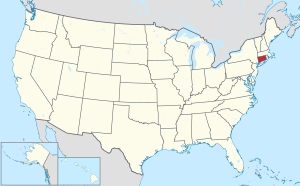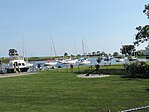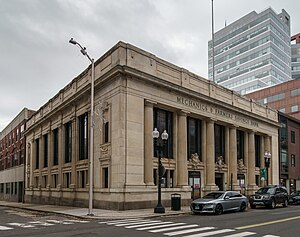Greater Bridgeport Planning Region, Connecticut
Greater Bridgeport Planning Region | |
|---|---|
| Connecticut Metropolitan Council of Governments (MetroCOG) | |
 Location within the U.S. state of Connecticut | |
 Connecticut's location within the U.S. | |
| Coordinates: 41°11′N 73°11′W / 41.18°N 73.19°W | |
| Country | |
| State | |
| Founded | 2013 |
| Largest city | Bridgeport |
| Government | |
| • Executive Director | Matthew Fulda |
| Area | |
• Total | 140.2 sq mi (363 km2) |
| Population (2020) | |
• Total | 325,778 |
| Time zone | UTC−5 (Eastern) |
| • Summer (DST) | UTC−4 (EDT) |
| Congressional districts | 3rd, 4th |
| Website | ctmetro |
The Greater Bridgeport Planning Region is a planning region and county-equivalent in Connecticut. It is served by the coterminous Connecticut Metropolitan Council of Governments (MetroCOG). In 2022, planning regions were approved to replace Connecticut's counties as county-equivalents for statistical purposes, with full implementation occurring by 2024.[1][2]
MetroCOG policies and activities
[edit]MetroCOG is a council of governments and a regional planning organization serving Bridgeport, Fairfield, Easton, Monroe, Stratford, and Trumbull. It regulates economic development, transportation, and environmental quality in the region. MetroCOG also serves as a "host agency" for the Greater Bridgeport and Valley Metropolitan Planning Organization.[3][4] Mike Tetreau, a Fairfield First Selectman, has served as Executive Director since 2018.[5] The headquarters of MetroCOG is located at 1000 Lafayette Blvd. in Bridgeport.
As of 2018, MetroCOG is looking into initiating a bike-sharing system that would service Bridgeport, Fairfield and Stratford and perhaps Trumbull, Monroe and Easton.[6]
Another priority of the council was to gain a "county government equivalence designation" from the United States Census in order to be able to apply for many federal programs as since 1960, Connecticut has no county governments.[7] This change was made official by the U.S. Census Bureau in 2022.
In 2017 the council worked to secure a $2,050,000 state grant to improve the Pequonnock River trail.[8]
Demographics
[edit]| Census | Pop. | Note | %± |
|---|---|---|---|
| 2020 | 325,778 | — | |
| 2022 (est.) | 327,286 | [9] | 0.5% |
| U.S. Decennial Census[2] | |||
As of the 2020 United States census, there were 325,778 people living in the Greater Bridgeport Planning Region.[2]
Municipalities
[edit]
The following municipalities are members of the Greater Bridgeport Region:[10]
References
[edit]- ^ "Governor Lamont Announces U.S. Census Bureau Approves Proposal for Connecticut's Planning Regions To Become County Equivalents". CT.gov. Retrieved March 24, 2023.
- ^ a b c "Change to County-Equivalents in the State of Connecticut". Federal Register. June 6, 2022. Retrieved March 24, 2023.
- ^ http://www.ctmetro.org/ Metropolitan Connecticut website
- ^ https://www.ct.gov/opm/cwp/view.asp?q=383046 Regional Councils of Governments (RCOGs) in Connecticut
- ^ Guinness, Meredith (January 24, 2018). "Fairfield's Tetreau To Lead Regional Metro Council". Bridgeport Daily Voice. Retrieved October 19, 2018.
- ^ Burgeson, John (October 9, 2018). "Area municipalities consider bike-share options". ctpost. Retrieved October 20, 2018.
- ^ Reilly, Genevieve (February 15, 2018). "'County-equivalent' designation could mean more federal money for towns". Fairfield Citizen. Retrieved October 20, 2018.
- ^ Zimmerman, Kevin (February 6, 2017). "Trumbull to receive $2M grant to connect river trail to commercial centers". Westfair Communications. Retrieved October 20, 2018.
- ^ "U.S. Census Bureau QuickFacts: Greater Bridgeport Planning Region, Connecticut; United States". www.census.gov. Retrieved May 13, 2023.
- ^ "About Us". MetroCOG. Retrieved March 24, 2023.








